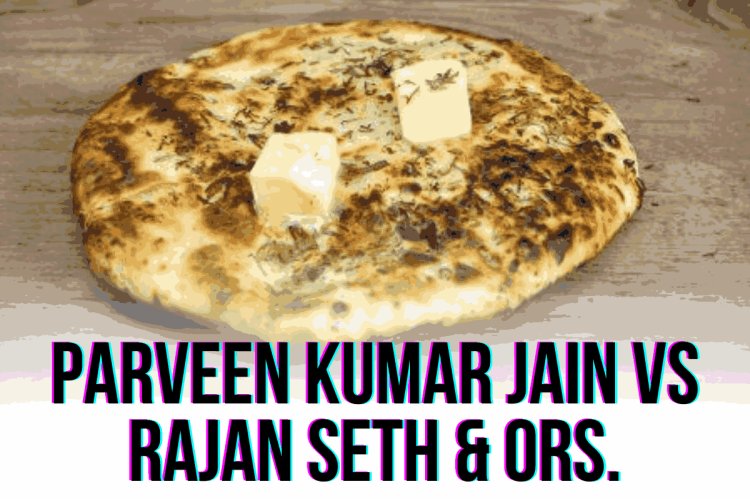Parveen Kumar Jain v. Rajan Seth & Ors.
This legal case involves a dispute between Mr. Praveen Kumar Jain, the plaintiff, and Mr. Rajan Seth & Ors., the defendants, regarding the use of the expression 'Chur Chur Naan' for their food outlets in Paharganj. The plaintiff claims exclusive rights over the expression and has filed a case seeking a permanent injunction for trademark infringement, copyright passing off, and other reliefs. The court's judgment weighs the plaintiff's trademark registrations against the generic nature of the expression and directs the defendants to distinguish their marks to prevent confusion.

Parveen Kumar Jain v. Rajan Seth & Ors.
CS(COMM) 213/2019
Decided on: 8 May, 2019
FACTS:
Mr. Praveen Kumar Jain (hereinafter referred to as "the Plaintiff) has filed a case against Mr. Rajan Seth & Ors. (hereinafter referred to as "the Defendant) in the High Court of Delhi (hereinafter referred to as "the Court"). The case is related to two food outlets based in Paharganj, which sell Naan and other food items. The Plaintiff claims to have exclusive rights over the expression 'Chur Chur Naan,' which the Defendant also uses for their outlet. The dispute is whether there can be a monopoly over the expression 'Chur Chur Naan' or 'Amritsari Chur Chur Naan.'
The Plaintiff has filed this case to seek a permanent injunction restraining infringement of trademark, copyright passing off, rendition of accounts, etc. The Plaintiff has claimed trademark rights over 'Chur Chur Naan,' 'Amritsari Chur Chur Naan,' and 'Paharganj Ke Mashoor Amritsari Naan,' and seeks an injunction against the Defendant.
CONTENTIONS OF THE PLAINTIFF
The Plaintiff claimed that they have applied for and obtained registration of various trademarks, including 'CHUR CHUR NAAN' and its variations. Two of these marks, 'CHUR CHUR NAAN' and 'AMRITSARI CHUR CHUR NAAN', are already registered. Since the Plaintiff's trademarks are registered, they enjoy exclusive rights under Sections 28 and 29 of the Trade Marks Act, 1999. The Plaintiff cited various cases, including Automatic Electric Limited v. R.K. Dhawan & Anr. 77(1999) and The Indian Hotels Company Ltd and Ors. v. Jiva Institute of Vedic Science and Culture 2008 (37) (Del), to argue that the Defendants cannot claim that the expression 'CHUR NAAN' is generic and descriptive since they have applied for the registration of the mark 'PAHARGANJ KE MASHOOR CHUR CHUR NAAN'. The Plaintiff further claimed that they have a significant reputation, as evidenced by television coverage as Paharganj Ke Mashoor Chur Naan. Therefore, they sought an injunction against Defendant Nos.1 and 2 from using the name 'PAHARGANJ KE CHUR CHUR NAAN' and 'AMRITSARI CHUR CHUR NAAN'. The Plaintiff also cited cases where descriptive marks, such as 'EENADU' and 'PAKWAN', were protected by courts.
CONTENTIONS OF THE DEFENDANT
The defendant argued that there are numerous establishments that use the name 'CHUR CHUR NAAN'. They further submitted that the plaintiff's trademarks lack basic distinctiveness and are therefore subject to rectification. Additionally, the defendant claimed that the phrase 'PAHARGANJ KE MASHOOR CHUR CHUR NAAN' is entirely descriptive and cannot be granted a monopoly as it is a generic expression.
COURT'S JUDGEMENT
The court recognized that the plaintiff had registration for the marks 'CHUR CHUR NAAN' and 'AMRITSARI CHUR CHUR NAAN', and therefore enjoys protection under Section 28 of the Trademark Act. However, these rights are subject to some exceptions carved out in the Act. Section 35 of the Act states that if there is a bona fide description of the character or quality of the goods or services, there cannot be infringement of a registered trademark.
The court also opined that expressions such as 'CHUR CHUR NAAN' cannot obtain a monopoly. The expressions are similar to expressions such as 'Amritsari Kulcha', 'Malabar Parantha', 'Hyderabadi Biryani', 'Kashmiri Dum Aloo', 'Chettinad Chicken', 'Murthal ke Paranthe', 'Mangalore idli', and other food products that are used in common parlance by the general public. The word 'CHUR CHUR' merely means 'crushed', and 'Chur Chur Naan' means 'Crushed Naan' and nothing more. It is incapable of acquiring trade mark signification.
The court recognized that various third-party websites such as zomato.com, justdial.com, eat treat. in, etc. are using 'CHUR CHUR NAAN' and 'AMRITSARI CHUR CHUR NAAN' with various prefixes and suffixes. The defendants have also shown on record that it is common practice in the trade for food outlets to use names such as 'Chandni Chowk Ke Mashoor', 'Dilli Ke Mashoor', 'Delhi Walo Ki Mashoor', etc. These are very common to the trade and are used by a large number of parties as is evident from the entries from third-party websites placed on record. Thus, there cannot be any monopoly on the terms 'CHUR CHUR NAAN' and 'AMRITSARI CHUR CHUR NAAN' as they same are generic.
The court held that the support of the judgments cited by the plaintiff could not be taken in the present case, as the expressions are completely generic. If registrations are wrongly granted or applied for in respect of completely generic expressions, the court cannot ignore the generic nature of the marks and confer a monopoly on the same in favour of any party. The court also noted that most of the entities are distinguishing themselves from each other by using prefixes that are distinctive in nature. For example, Sanjay Chur Chur Naan, Vijay Chur Naan, N.S. Chur Chur Naan, Chawla de Mashoor Chur Chur Naan, etc.
In view of the same, the court directed the defendants to distinguish their marks from that of the plaintiff, which was 'PAHARGANJ KE MASHOOR CHUR NAAN', in order to avoid consumer deception or confusion.
COURT ANALYSIS
The court granted protection to the plaintiff's 'CHUR CHUR NAAN' and 'AMRITSARI CHUR CHUR NAAN' marks under Section 28 of the Trademark Act. However, the court emphasized that the protection is subject to exceptions under Section 35, which allows for the bona fide description of the goods or services. The court held that these expressions cannot be granted a monopoly and directed the defendants to distinguish their marks from the plaintiff's to prevent confusion or deception.












